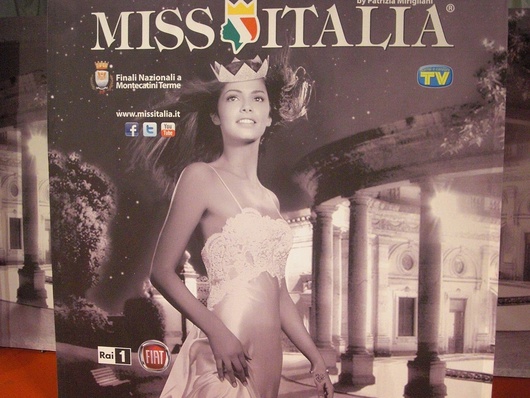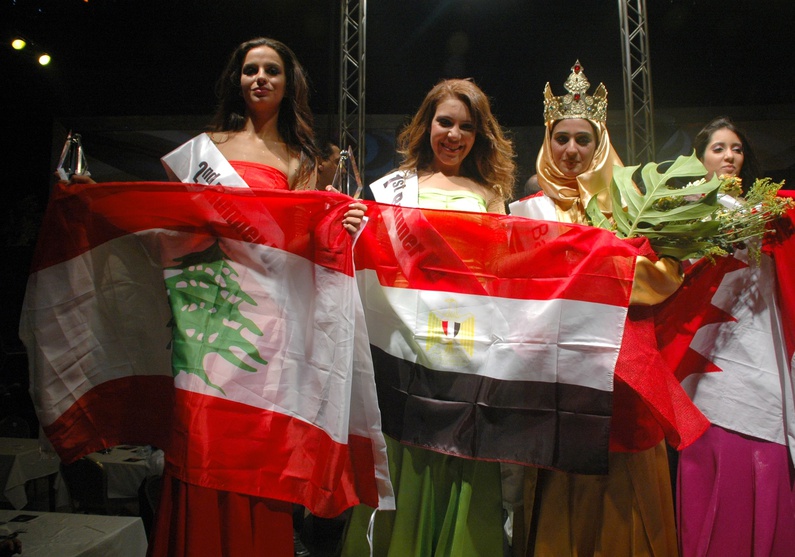
Miss World: Behind the sashes and sequins
Published on
Translation by:
Maria-Christina DoulamiFor years, feminists from different countries have been campaigning against beauty pageants. And in Argentina they have managed to win: in Chivilcoy such contests were banned.
But do these contests really commercialise the female body? And what about Muslim candidates, who are covered from head to toe?
London, December 14: South African Rolene Strauss was crowned Miss World 2014 in a pageant that was strongly criticised and defined as misogynist by some feminist groups. It is neither the first or last time that a beauty pageant receives similar allegations: a week later, in fact, the city council of Chivilcoy, an Argentine city in the province of Buenos Aires, outlawed this kind of contest as "discriminatory practice and sexist.”
It is the first time that we've witnessed an “official” ban on beauty queens. Advocates of the ban said the pagaents “reinforce the idea that women should be evaluated and rewarded solely for their physical appearance, based on stereotypes.” Therefore, as reported by journalist Claudia Marengo, "in 2015, instead of a beauty pageant, Chivilcoy will organize a competition of handcrafted masks, or persons between 15 and 30 years old will be awarded for having distinguished themselves in social activities. I hope that soon this will be imitated by many. "
Defending beauty pageants: business versus social causes
 Certainly this opinion is being expressed in other countries too, but there are also those who favour the pageants. This includes Italian Senator Silvana Amati who. In 2013, when Rai 1, the Italian public service television channel, announced it would stop broadcasting the Miss Italy pageant, she asked a question in Parliament, "both in order to understand the reason for this choice, as well as for the historical importance of the pageant, and for the social campaigns carried out by Miss Italy.” The Senator also replied to an open letter of protest by numerous feminist bloggers, stating, "Our television still provides absolutely questionable female images and no one can wipe their conscience clean, solely by eliminating the final round of Miss Italy, a pageant that has been profoundly transformed in recent years since a woman has been running it. I do not think it is, therefore, right to trivialise the issue of social campaigns that the contest has recently conveyed. What is most notable is certainly the commitment against anorexia and the imposition of a model of extreme and dangerous thinness.” Eventually, after many questions and debates, the pageant was aired on a private network (La7).
Certainly this opinion is being expressed in other countries too, but there are also those who favour the pageants. This includes Italian Senator Silvana Amati who. In 2013, when Rai 1, the Italian public service television channel, announced it would stop broadcasting the Miss Italy pageant, she asked a question in Parliament, "both in order to understand the reason for this choice, as well as for the historical importance of the pageant, and for the social campaigns carried out by Miss Italy.” The Senator also replied to an open letter of protest by numerous feminist bloggers, stating, "Our television still provides absolutely questionable female images and no one can wipe their conscience clean, solely by eliminating the final round of Miss Italy, a pageant that has been profoundly transformed in recent years since a woman has been running it. I do not think it is, therefore, right to trivialise the issue of social campaigns that the contest has recently conveyed. What is most notable is certainly the commitment against anorexia and the imposition of a model of extreme and dangerous thinness.” Eventually, after many questions and debates, the pageant was aired on a private network (La7).
Beyond the quarrels between television networks, the cultural problem persists. Do beauty pageants, where contestants parade in swimsuits in front of judges ready to rate and express what they think of their bodies, commercialise and objectify women? Or are they just another way to offer young girls the opportunity to enter the world of entertainment and to improve the visibility of social campaigns?
The Miss of the Muslim World
 However, not all competitions involve catwalks of girls with skimpy clothes. In Miss Arab World and in Muslimah World - the main beauty pageants of the Muslim world - the figures of the competitors are well covered. In Miss Arab World women can participate with or without a veil: the important thing is to overcome cultural and behavioural tests. In fact, the jury looks for "beauty and pride of the mind" when choosing "an honourable young Miss who will represent the Arab culture for 12 months."
However, not all competitions involve catwalks of girls with skimpy clothes. In Miss Arab World and in Muslimah World - the main beauty pageants of the Muslim world - the figures of the competitors are well covered. In Miss Arab World women can participate with or without a veil: the important thing is to overcome cultural and behavioural tests. In fact, the jury looks for "beauty and pride of the mind" when choosing "an honourable young Miss who will represent the Arab culture for 12 months."
In Muslimah World, however, only girls who wear the hijab are permitted to enter. And, during the selection, they must explain precisely what has driven them to wear it. Shanti, the Indonesian TV presenter fired in 2006 for refusing to remove the hijab, explains that she had the idea of "Miss Muslim" after the September 11 attacks in the US. She wanted to combat the negative image that was attached to her religion. "We are Islam’s answer to Miss World," she states proudly. However, the creator does not join the appeals of the Islamists who want to cancel Miss World. "We prefer to show our girls that they have a choice between that pageant and Miss Muslim."
One wonders what is worse: being labelled as someone responsible for the commercialisation of women's bodies by agreeing to parade in a swimsuit, or being criticised as subduing oneself to male censorship by covering up with a veil even during a beauty pageant. One possible answer is this: feminism should mean freedom for every woman to give herself any image she considers dignified and appropriate for her sensitivity and her own self-esteem, as well as the right not to be judged for it.
Rolene Strauss, Miss World 2014, announced that one of her first tasks in the role would be to attend the inauguration of construction works for a school in Honduras. The school will bear the name of Maria José Alvarado, who should have entered the pageant, representing the Central American country, but was brutally killed together with her sister, by her boyfriend.
Their bodies were found the same day that Maria was to depart for London. An act of violence that deserves the wrath of feminists more than any beauty pageant does.
Translated from Il mondo delle Miss: cosa c'è dietro fasce e lustrini?



